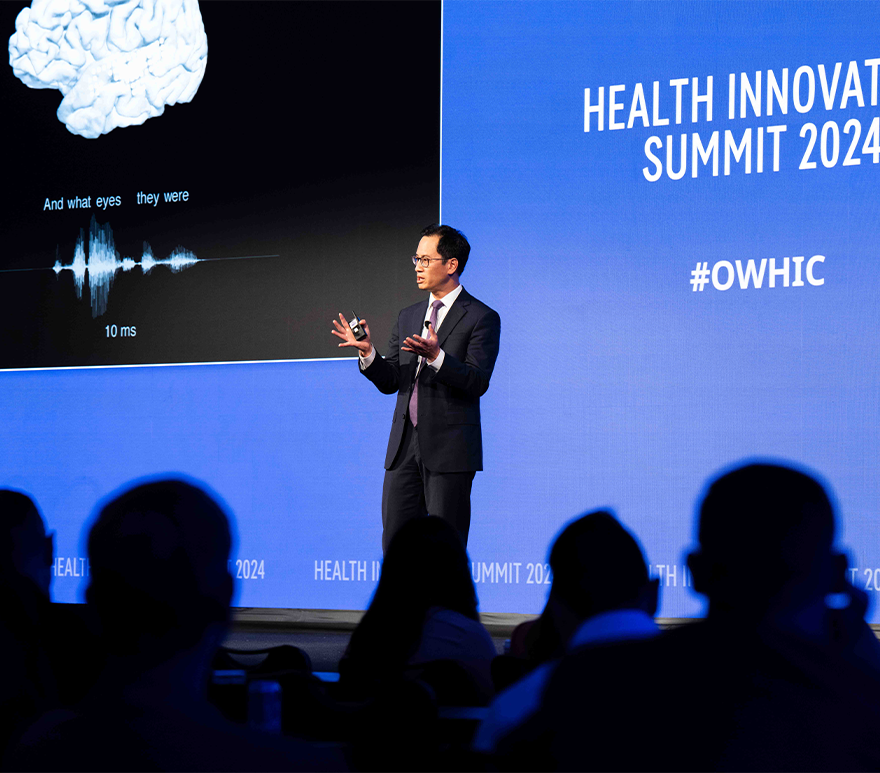The potential for artificial intelligence to reshape healthcare was front and center throughout the 2024 Oliver Wyman Health Innovation Summit. Attendees visiting an interactive exhibit — the Inspiration Experience — saw demonstrations on how AI can radically influence patient care using digital twins to run treatment simulations, as well as how the technology can accelerate new drug discoveries. Main stage speakers talked about deploying AI and redesigning workflows to not only eliminate unnecessary tasks but bring the joy back to practicing medicine.
But perhaps the most fantastical use showcased at the Health Innovation Summit was something straight out of science fiction. Work pioneered by Edward Chang, M.D., Chair, Department of Neurological Surgery, UCSF, is giving a voice, literally, to paralyzed stroke patients. By thinking about the neurological pathways in the brain as coding, Chang and his team developed technology that uses sensors attached to the brain to capture the electronic impulses in the motor cortex, sends those via an HDMI cable to a computer, and uses language-prediction algorithms to translate them into words and sentences on a screen. The platform has evolved to a point where they can now synthesize an existing recording of the patient, generate an avatar, and give sound to those words.
Beyond speech, researchers are developing technology that interacts with brain signals to treat conditions like depression.
Leveraging AI to speed up innovation
Similar to advances being made at UCSF, drugmaker Pfizer is using AI and data to hasten drug discovery, manufacturing, and, importantly, the patient experience. AI technology, for instance, helped trim nearly six years off the time it would have normally taken to get a cancer drug from phase 1 to regulatory approval. Additionally, AI-driven manufacturing processes reduced cycle times by 25%, Lidia Fonseca, Chief Digital and Technology Officer, Executive Vice President, Pfizer, said.
She also spotlighted how AI is being used to craft personalized messaging about drugs for both patients and their clinicians. That, in turn, enables a more productive conversation about a treatment plan.
Ensuring equity of care is table stakes
While leaders look for opportunities to deploy and scale breakthrough technology, they must still find solutions for one of the most vexing problems ailing healthcare — health equity. Speaker after speaker noted the disparities that exist across the nation. Black women face a 41% higher mortality rate from breast cancer than their white counterparts, despite similar incidence rates. Populations living a few miles apart have vastly different health outcomes due to gaps in access and quality. And the list goes on.
There are solutions to the problem and that gap can shrink. By leveraging advancements in genetic testing and early detection technologies, individuals at high risk of cancer can be identified before the late stages of the disease, Feyi Ayodele, Founder and CEO, CancerIQ, Inc., explained. For example, individuals with certain genetic mutations should receive proactive measures, such as prophylactic surgeries or more frequent screenings to mitigate their risk.
Unfortunately, she noted, access to these types of innovations is uneven. Many patients, particularly those in underserved areas, lack the resources or knowledge to pursue preventive care. To combat this, she said the industry must prioritize integrating genetic counseling and testing into primary care settings.
Finding ways to ensure that at-risk populations are getting resources to address health disparities is something that Niyum Gandhi, Chief Financial Officer and Treasurer, Mass General Brigham, is passionate about. He detailed how the large Boston-based health system is turning the concept of return on investment on its head. There’s always been a challenge, he said, quantifying the impact of investments in healthcare programs, whether that’s research or population health projects.
Mass General’s approach is to move away from what Gandhi called a "sprinkler strategy" of funding various initiatives to a more accountable approach that ties investments directly to health outcomes. This means setting clear metrics and holding leaders across the organization accountable for achieving them. Mass General is using community-based data to drive that decision making. For instance, data showed that 57% of excess deaths in its communities are driven by cardiometabolic diseases; cancer is also a leading cause of death. By focusing on blood pressure screenings, controlling hypertension, and cancer screenings in community settings, Mass General is closing the mortality gap between racial groups.
Building partnerships and restoring trust
Accelerating the move toward more efficient, comprehensive, and equitable care will require deeper policy conversation and, critically, restoring trust in government, said Alice Hm Chen, M.D., Chief Health Officer, Centene.
The COVID-19 pandemic demonstrated the importance of public-private partnerships, she said, in delivering life-saving therapies. The rapid deployment of vaccines showcased how effective collaboration can lead to significant health outcomes. Building off that success is critical and requires effective government-industry partnerships. She noted how many insurers, once they win Medicaid managed care contracts, work in concert with competitors and regulators to ensure outcomes measures are being met.
Transforming healthcare for all communities also requires greater integration of social services with medical care, she added. Countries that invest more in social determinants of health, such as education and housing, see better health outcomes.
“We need more people talking about science. We need more people talking about facts,” she said. “Government has a really important role to play, but even public-private partnerships are challenged because of a lack of faith in government.”


